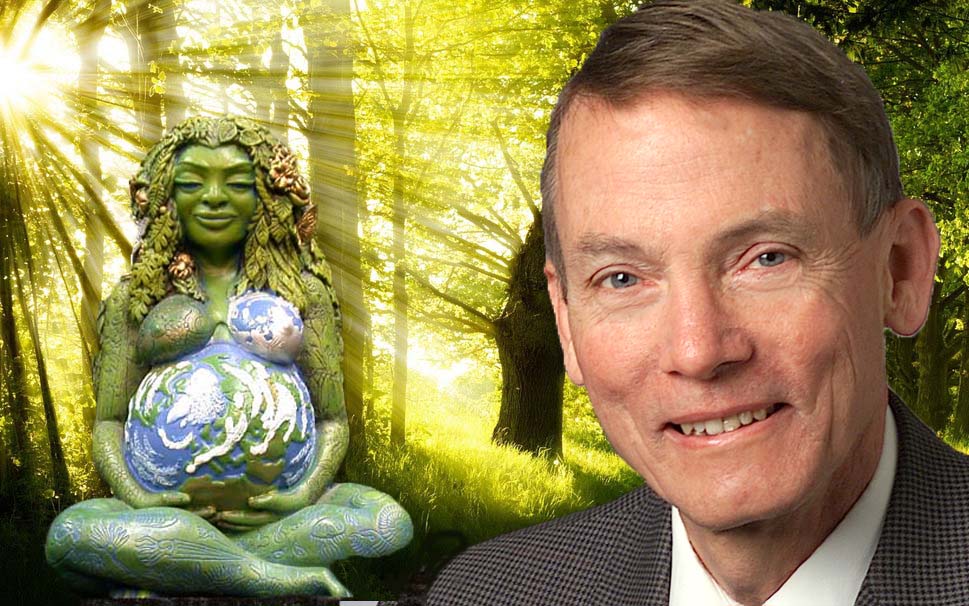
Eerder heb ik in vijf ‘postings’ (de laatste hier) aandacht geschonken aan de denkbeelden van William Happer over het klimaat. Happer, die in wetenschappelijke kringen in hoog aanzien staat, is als emeritus hoogleraar aan Princeton verbonden en is kandidaat voor de post van wetenschappelijk adviseur in de Regering Trump.
Zoals mijn trouwe lezers weten, staat de Britse ‘Guardian’ bekend als een fervent apostel van het broeikasevangelie. Alles wat ook maar enigszins afbreuk zou kunnen doen aan de klimaathysterie wordt stelselmatig uit de krant geweerd, net zoals dat voor een groot deel van de Nederlandse media geldt. Ik viel dan ook bijna van mijn stoel van verbazing toen ik het uitstekende interview van Hannah Devlin met William Happer in ‘The Guardian’ las, waarin zij gewoon recht voor zijn raap schreef hoe deze over de huidige klimaathype dacht.
Tja, met de komst van Donald Trump mag er op klimaatgebied nu veel hardop worden gezegd, waarover vroeger moest worden gezwegen. Zie ook Simon Rozendaal: ‘With Trump in Office, Now Safe to Expose the Many Myths of Climate Alarmism.’
Onder de titel, ‘Trump’s likely science adviser calls climate scientists ‘glassy-eyed cult”, schreef Devlin:
The man tipped as frontrunner for the role of science adviser to Donald Trump has described climate scientists as “a glassy-eyed cult” in the throes of a form of collective madness.
William Happer, an eminent physicist at Princeton University, met Trump last month to discuss the post and says that if he were offered the job he would take it. Happer is highly regarded in the academic community, but many would view his appointment as a further blow to the prospects of concerted international action on climate change.
“There’s a whole area of climate so-called science that is really more like a cult,” Happer told the Guardian. “It’s like Hare Krishna or something like that. They’re glassy-eyed and they chant. It will potentially harm the image of all science.”
Trump has previously described global warming as “very expensive … bullshit” and has signalled a continued hardline stance since taking power.
Happer also supports a controversial crackdown on the freedom of federal agency scientists to speak out about their findings, arguing that mixed messages on issues such as whether butter or margarine is healthier, have led to people disregarding all public health information.
“So many people are fed up of listening to the government lie to them about margarine and climate change that when something is actually true and beneficial they don’t listen,” he said, citing childhood vaccines as an example. “The government should have a reputation of being completely reliable about facts – real facts.”
Happer dismissed concerns that Trump is “anti-science”, saying he had a positive impression of the president during their January meeting. “He asked good questions – he was very attentive, actually,” he said.
Climate change was mentioned but was not the main focus of discussions, according to Happer, who revealed that Trump had expressed support for solar energy in areas like Arizona “where it makes sense”.
“His comments were that of a technically literate person,” he said. “He wasn’t ideologically opposed to renewables; he wasn’t ideologically in favour of them either.”
Unlike many of his scientific peers, Happer is in favour of contentious legislation aimed at reining in the ability of federal agency staff to hold press conferences, give television interviews and promote their findings on official websites. …
“There is this special need for government science to be especially clean and without fault,” said Happer. “It’s OK to have press conferences, but before you do that you should have the findings carefully vetted.”
When asked for examples of where the current vetting process has failed, Happer cited a recent controversy surrounding a high-profile paper published by National Oceanographic and Atmospheric Administration (Noaa) scientists showing that global surface temperatures had risen again after temporarily levelling off.
Zie ook hier.
Earlier this month, a retired Noaa scientist, Robert Bates, accused his former colleagues of rushing out the paper ahead of the UN conference, prioritising political impact over scientific rigour – although Bates later clarified that he had an issue with timing and transparency rather than “tampering with data”.
“This disappearance of the hiatus in global warming, which was trotted out just before the [UN] Paris conference … it was clearly just a political fanfare,” said Happer. “We shouldn’t be doing that. They were fiddling with the temperature records to make the hiatus go away.” …
Happer said he began to question the emerging consensus view on climate change while working as director of research at the Department of Energy as part of the George W Bush administration. Climate scientists would “grudgingly” present their work to administrators, he claims, while those in other fields would share their results with enthusiasm. “I would ask questions but they were evasive and wouldn’t answer,” he said. “This experience really soured me on the community. I started reading up and I realised why they weren’t answering the questions: because they didn’t have good answers. It was really at that point that I began to get seriously worried about climate as a science.”
Lees verder hier.
Wat dit laatste betreft hebben vele klimaatsceptici overal ter wereld soortgelijke ervaringen wanneer zij in contact poogden te komen met voorstanders van de AGW-hypothese (AGW = ‘Anthropogenic Global Warming’).
Als Happer c.s. hun zin krijgen heeft dit revolutionaire gevolgen voor het Amerikaanse energie- en klimaatbeleid dat wetenschappelijk gezien wordt gelegitimeerd door de (onbewezen) AGW-hypothese. Op wetenschappelijk gebied zal onder politiek druk de AGW-hypothese waarschijnlijk plaats moeten maken voor een ander paradigma, waarin natuurlijke factoren een grotere rol spelen. Voor wie voorstander is van de vrijheid van wetenschap is dit geen ideale gang van zaken. Maar als het niet kan zoals moet, moet het maar zoals het kan. Daarnaast zal afstand worden genomen van het door de regering Obama gevoerde decarboniseringsbeleid. Op grond van hun uitlatingen tot dusver mogen we verwachten dat de Europese landen de VS hierin voorlopig niet zullen volgen. Maar we hebben vaak in de geschiedenis gezien dat ontwikkelingen in de VS toch uiteindelijk naar Europa komen overwaaien, zeker als de opwarmings’pauze’ zich verder voortzet, de temperaturen dus niet verder stijgen en het Amerikaanse beleid economisch succesvol blijkt te zijn.
We leven in interessante tijden.
Voor mijn eerdere bijdragen over klimaat en aanverwante zaken zie hier, hier, hier, hier en hier.






dagelijkse onzin berichten.
” Het wordt vandaag 12 graden en normaal is 6 is een van de veel gehoorde kreten bij ons weerbericht hoe groot de spreiding is in de temperatuur op een willekeurige dag in februari wordt er niet bij vertelt. ”
Dagelijks zie je vele boodschappen die niets anders beogen als het geloof in global warming aan te wakkeren.
De pers- en weerberichten van het KNMI en de commerciële weerbedrijven zijn al jaren bezig om de publieke opinie te beïnvloeden wat kunnen wij er aan doen?
Happer op Princeton, prima popperiaanse wetenschapper, en wat een verschil met de vooringenomen gepolitiseerde opwarmingsalarmist, voormalig KNAW-directeur Robbert Dijkgraaf nu op Princeton. Als KNAW directeur gaf hij bewust foute antwoorden (als hij al kritische vragen beantwoordde) en ook gisteren op het DWDD-platform deed hij weer zijn (valse) politieke mantra. Princeton tegenwoordig is minder vooraanstaand met een dergelijke groen politieke guru in haar gelederen.
http://climategate.nl/2010/03/10/hoe-broeikasgelovig-is-dijkgraaf/
http://climategate.nl/2011/11/04/knaw-klimaatbrochure-was-geen-eenmalig-incident/
Vreemd dat Dijkgraaf het zo ver heeft gebracht in de wetenschap met een dergelijke niet kritische houding.
Ik kan me niet voorstellen dat hij niet weet wat er aan de hand is. Dus of hij stelt de zaken bewust verkeerd voor, of hij is ten onrechte op deze positie benoemd en ongeschikt.
Maar dit laatste geldt voor velen in klimaatpolitiek en wetenschap.
Dijkgraaf haalt Freeman Dyson aan die gezegd zou hebben dat het misschien wel goed is dat Trump aan de macht is gekomen om de tegenstem te laten horen. Hij vergeet te vermelden dat deze beroemde natuurkundige totaal niet gelooft in het klimaat-alarmisme en opmerkt dat CO2 verhoging goede kanten heeft, bijvoorbeeld vergroening. Zoiets heet toch selectief citeren?
Mooi artikel dat laat zien hoe daar de zaken er beginnen uit te zien. Ik wacht het met spanning af. Verder is dit een interessante uitzending geweest van de NPO over thoriumreactoren:
http://www.nporadio1.nl/de-ochtend/onderwerpen/342387-thorium-een-duurzame-vorm-van-kernenergie